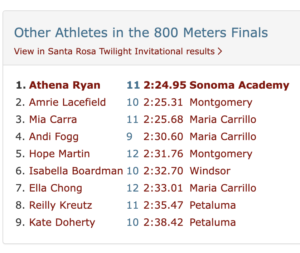A recent high school track and field event in California has stirred up a heated debate surrounding transgender athletes and their participation in girls’ sports.
Adeline Johnson, a promising athlete from Branson High School, expressed her disappointment by giving a thumbs down gesture on the medal podium after losing to Athena Ryan, a transgender female athlete, in the 1600 meter race. The incident has sparked protests and ignited discussions about fairness and inclusivity in athletic competitions.
During the CIF-North Coast Section Meet of Champions, Adeline Johnson secured a fourth-place finish in the highly competitive 1600 meter race.
However, her dissatisfaction became evident as she waved at the crowd before delivering a thumbs down gesture during the medal presentation. The act captured attention and triggered a broader conversation about the inclusion of transgender athletes in gender-specific sports.
The presence of protestors advocating to protect female sports at the track meet added another layer of tension to the already contentious issue.
Signs and banners with slogans supporting the exclusion of transgender athletes from girls’ events were displayed, leading to clashes with security personnel. While some individuals took offense at the protestors’ message, others defended their right to express their concerns about the fairness of competition.



The Independent Council on Women’s Sports (ICONS) shared a video of Johnson’s thumbs down gesture on social media platforms, attracting significant attention. While the video incorrectly referred to Athena Ryan as a “trans-identifying male,” it highlighted Johnson’s reaction to her placement in the race as per dailymail.
The controversy surrounding the incident gained traction online, with various groups expressing their viewpoints on transgender athletes’ participation in women’s sports.
The California Interscholastic Federation (CIF) follows “Gender Identity Participation” rules that have been in place since 2013. These rules emphasize that students should have the opportunity to participate in athletics and activities according to their gender identity. Once eligibility is granted, it does not need to be renewed each school year. T
hese guidelines have been the subject of intense debate, with proponents arguing for inclusivity and opponents expressing concerns about fairness.
The controversy surrounding transgender athletes’ participation in girls’ sports extends beyond California.
In April, House Republicans passed a bill banning transgender women and girls from competing in female school athletics. Democrats, however, oppose the bill, emphasizing the importance of inclusivity and protection for transgender students.

